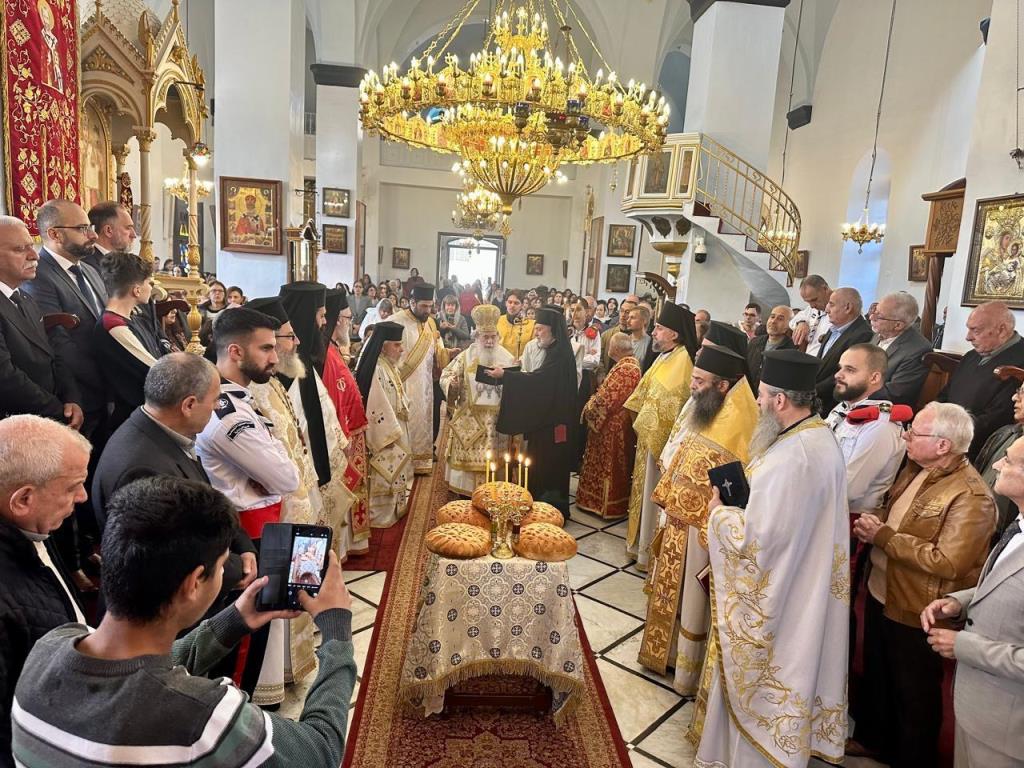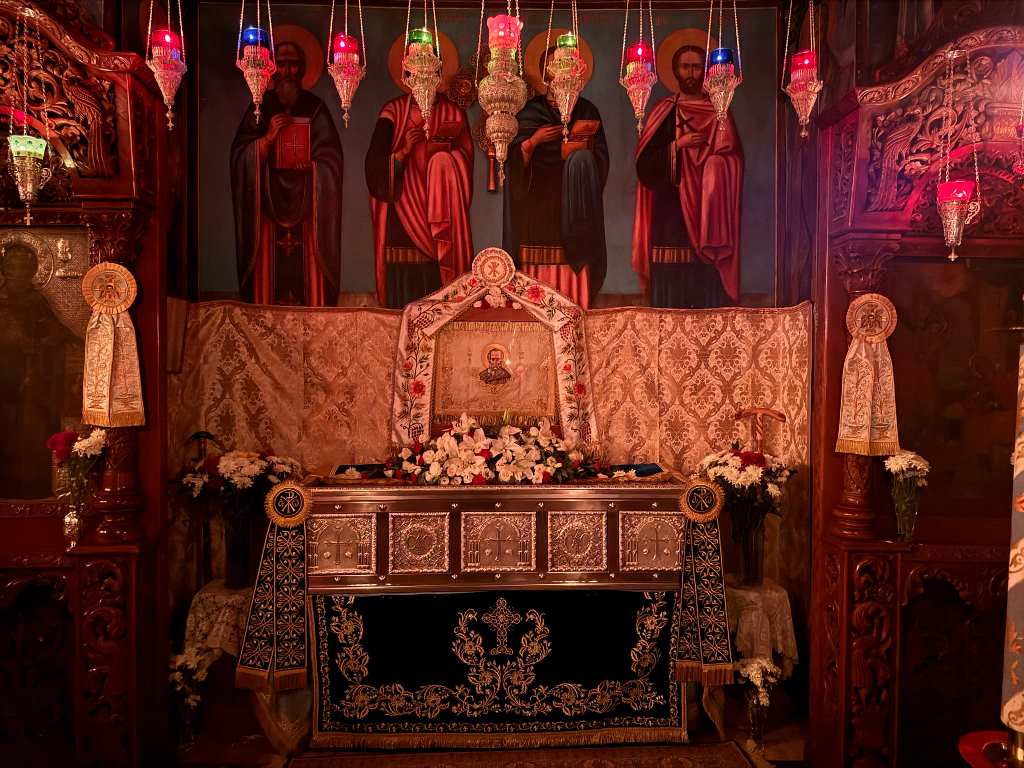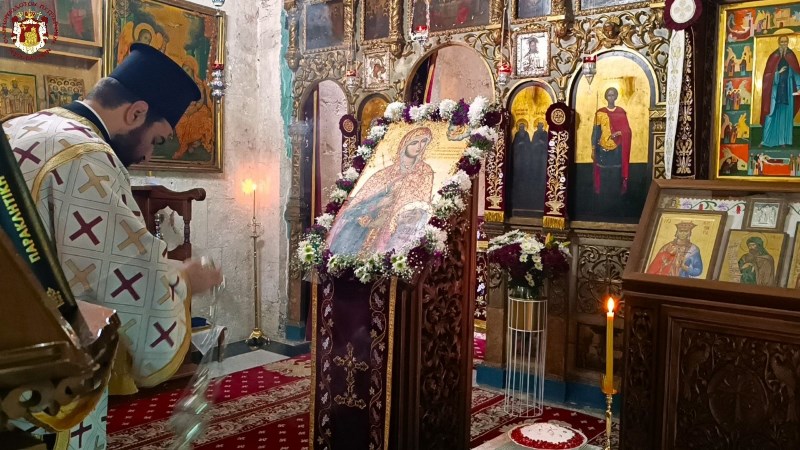Virgin Martyr Juliana of Nicomedia, and 500 men and 130 women with her (21 December)
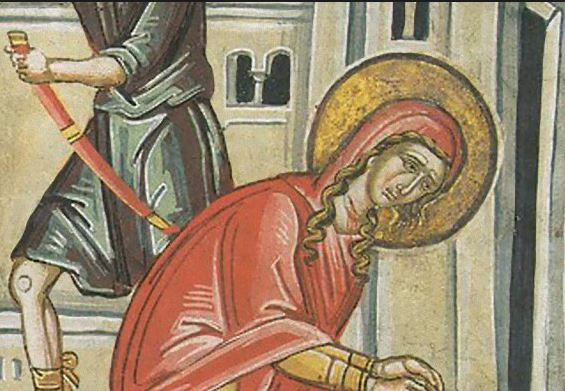

The Holy Virgin Martyr Juliana, daughter of an illustrious pagan named Africanus, was born in the city of Nicomedia. As a child, she was betrothed to a certain Elusius, one of the emperor’s advisors. Saint Juliana was endowed with a profound intellect and goodness of soul. She saw through the delusion and deception of the pagan faith, and secretly accepted holy Baptism.
When the time of her wedding approached, Juliana refused to be married. Her father urged her not to break her engagement, but when she refused to obey him, he began to beat her viciously. Then Africanus handed his daughter over to the Eparch, who happened to be Elusius, Juliana’s former fiancé. Elusius fervently asked Juliana to marry him, promising not to require her to abandon her faith. Saint Juliana refused and said that she’d rather be put to death.
They beat the saint both long and harshly, but after each beating she received healing and new strength from God. Her punishment took place before a large number of people. Of these, 500 men and 130 women came to confess Christ after witnessing the steadfastness and courage of the holy virgin miraculously healed from her wounds. They were all beheaded, and were baptized in their own blood.
Convinced of the futility of attempting to separate the holy virgin from her heavenly Bridegroom, Eleusius sentenced Juliana to death. She accepted the sentence with joy and glorified the Lord for permitting her to receive a martyr’s crown. The holy Martyr Juliana was executed in the year 304.
Saint Juliana is the subject of an Anglo-Saxon poem, believed to have been written by Cynewulf in the eighth century.
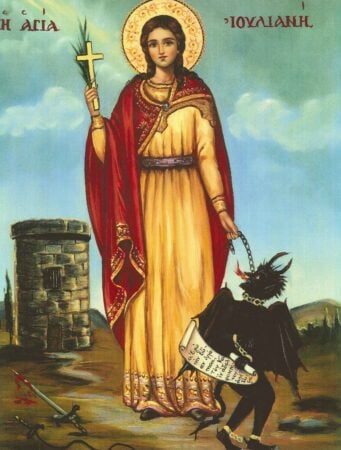

Saint Juliana, who was from Nicomedia, lived during the years of Maximian and was the daughter of wealthy parents. They were pagans, but she was secretly a Christian. Without consulting her, her parents betrothed her to an idolater named Eleusius, who was a member of the Senate. She, not wishing to marry him, told him that unless he became eparch, she would not marry him. When he had obtained this position, she told him that unless he renounced the religion of the idols and became a Christian, she would have nothing to do with him. Eleusius then told Juliana’s father of this. He attempted to turn her from the Faith of Christ, but when he saw that she could not change her constancy, he gave her up to the Eparch, Eleusius her betrothed, to be tried according to the law. When he could not persuade her to do his will, he subjected her to the most inhuman tortures and after imprisoning her, cast her into a furnace. But by the grace of God, the furnace was marvellousy quenched. Seeing this, some five hundred men and one hundred and thirty women believed in Christ and were beheaded for His sake. After further torments, she was beheaded, in the year 299.
This glorious virgin and martyr was born in Nicomedia of pagan parents. Hearing the Gospel preached, she turned to Christ with all her heart and began to live in exact observance of the Lord’s commandments. Eleusius, a senator, was her betrothed. In order to turn him away, Juliana told him that she would marry him only if he became the eparch of that city. She suggested this to him, thinking that this young man would never attain such a high position. Nevertheless, Eleusius tried and, by flattery and bribery, attained the post of Eparch of Nicomedia. Juliana then revealed to him that she was a Christian and could not enter into marriage with him until he embraced her Faith, saying: “What does it benefit us to be united physically but divided spiritually?” Embittered by this, Eleusius denounced her to her father.
The enraged father scorned her, beat her, and then handed her over to the eparch for torture. The eparch ordered that they severely beat her, then she was cast into prison, all wounded and bloody. However, the Lord healed her in prison, and she appeared before the eparch completely well. He then threw her into a glowing furnace but the fire did not burn her. Seeing this miracle, many believed in Christ God. Five hundred men and one hundred and thirty women were converted. The eparch condemned them all to death and ordered them all to be beheaded. Thus their souls entered Paradise. Then the wicked judge condemned holy Juliana to be beheaded.
With a joyful spirit, Juliana went out to the place of execution, prayed to God on her knees, and placed her head on the block. Her head was severed and her soul went to the Kingdom of Christ’s eternal light in the year 304 A.D. God’s punishment quickly befell Eleusius: as he was sailing on the sea, his ship broke up and he fell into the water. He did not find death in the water, but swam to an island, where dogs tore him to pieces and devoured him.
Apolytikion of Martyr Juliana of Nicomedia
Fourth Tone
O Lord Jesus, unto Thee Thy lamb doth cry with a great voice: O my Bridegroom, Thee I love; and seeking Thee, I now contest, and with Thy baptism am crucified and buried. I suffer for Thy sake, that I may reign with Thee; for Thy sake I die, that I may live in Thee: accept me offered out of longing to Thee as a spotless sacrifice. Lord, save our souls through her intercessions, since Thou art great in mercy.
Kontakion of Martyr Juliana of Nicomedia
First Tone
A comely virgin wast thou, O wise Juliana; and as thy soul was wounded with love for thy Maker thy body was also pierced through with comely martyric wounds, which adorned thee as the bride of Christ and His Martyr; now as thou dost dwell in the bridechambers of Heaven, thou prayest for all of us.
Source: oca.org / goarch.org / westserbdio.org


